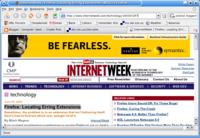Hotmail can't verify itself
OK, I know it's like shooting fish in a barrel, but it's time to poke fun at Microsoft once again. The Sender ID framework developed by Microsoft and other industry partners is...

It looks like they forget to register their own servers with Sender ID. Oops.
... an e-mail authentication technology protocol that helps address the problem of spoofing and phishing by verifying the domain name from which e-mail is sent. Sender ID validates the origin of e-mail by verifying the IP address of the sender against the purported owner of the sending domain.In principle, it's a great idea and Microsoft has already started using it with Hotmail which is owned by them. But as my cropped screenshot below shows, they need to work a little bit more on the implementation (click graphic for larger version):

It looks like they forget to register their own servers with Sender ID. Oops.



